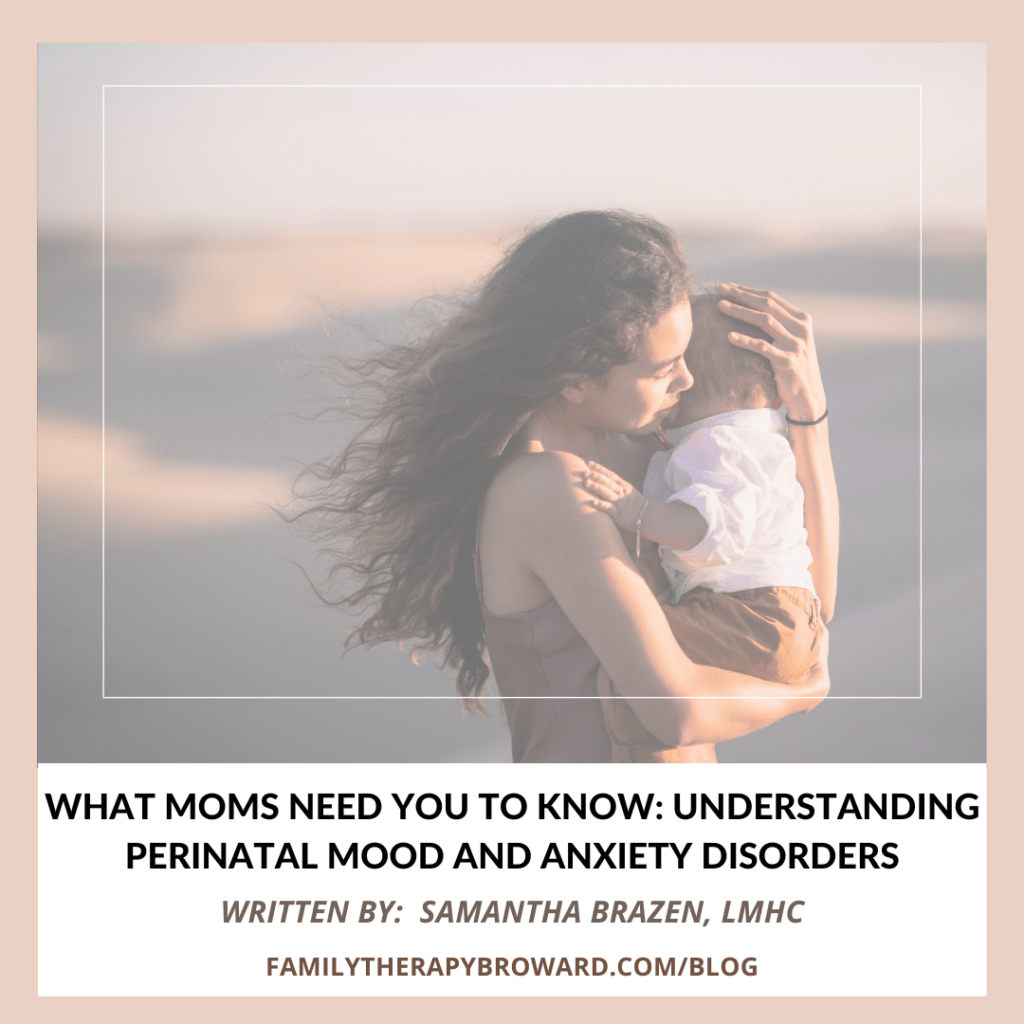
What Moms Need You to Know: Understanding Perinatal Mood and Anxiety Disorders
Written By: Samantha Brazen
Being pregnant or bringing new life into this world is often depicted as a time of joy, excitement, and fulfillment. However, for many individuals, the perinatal period, encompassing pregnancy and the first year postpartum, can be accompanied by a range of emotional challenges.
Perinatal Mood and Anxiety Disorders (PMADs) are a group of mental health conditions that affect individuals during this critical time, casting shadows and preventing a sense of peace.
Defining Perinatal Mood and Anxiety Disorders:
When we think of the perinatal period and mental health, Post-Partum Depression tends to come to mind. However, there are many more issues women can struggle with during this transformative time. PMADs include a spectrum of mental health conditions including depression, anxiety, OCD, PTSD, and psychosis. These disorders can manifest during pregnancy or within the first year after childbirth, impacting the well-being of both parents.
Recognizing the Signs of PMADs:
It’s crucial to recognize the signs of PMADs to ensure early intervention and support. Symptoms may vary, but common indicators include strong Baby Blues (feeling tearful and moody during the 2 weeks following birth), persistent feelings of sadness, irritability, anxiety, difficulty bonding with the baby, frequent or uncontrollable crying, and intrusive and/or uncontrollable thoughts. Understanding that these symptoms are not a reflection of inadequacy, but rather a medical condition is a crucial step toward seeking help.
Risk Factors:
Various factors can contribute to the development of PMADs. These may include hormonal fluctuations, irregular thyroid levels, a personal or family history of mental health issues, challenging life events, a lack of social/emotional support, and research shows that minority women at are a higher risk of developing a PMAD. Understanding these risk factors can better help healthcare professionals and support networks identify those in need and provide targeted assistance.
Breaking the Stigma:
Despite affecting approximately 1 in 5 individuals during the perinatal period, PMADs often go undiagnosed and untreated due to the stigma surrounding mental health. While bringing a baby into this world is an incredibly precious experience, it is also an entirely challenging and life-altering experience. Many parents are afraid to seek help as they feel shameful or guilty for their struggles. We need to normalize the challenges pregnancy and parenthood bring to our society. Education and open conversations play a pivotal role in dismantling the barriers to seeking support.
Support Systems and Resources:
Creating a strong support system is vital for individuals experiencing PMADs. Family, friends, and community networks can offer emotional support and practical assistance. Healthcare professionals, including obstetricians, pediatricians, and mental health specialists are imperative sources of support and play a crucial role in properly identifying and addressing PMADs.
Treatment Options:
Treatment for PMADs may involve a combination of therapy, medication, and lifestyle modifications. Cognitive-behavioral therapy (CBT) has shown effectiveness in treating various PMADs. In some cases, medication may be prescribed under the guidance of a healthcare professional. Support from loved ones and mental health professionals is pivotal for individuals are undergoing treatment.
Perinatal Mood and Anxiety Disorders are complex and multifaceted, affecting individuals during a transformative period in their lives. We can create a more compassionate and understanding society by fostering awareness, breaking the stigma, and providing support. It is essential to recognize that seeking help is a sign of strength, and with the right support, individuals can navigate the shadows of PMADs toward a brighter, healthier future.
If you or a loved one is struggling, contact us at Family Therapy Group of Weston where we have a team of experienced mental health practitioners ready to provide support.
Written by Samantha Margaritis
From Samantha's bio...
Samantha approaches each individual she works with respect, patience and understanding. Her objective is to meet each individual child/teen where they are, and implement an individualized path of treatment that facilitates emotional and behavioral growth. Her areas of interest include treatment for anxiety disorders, obsessive-compulsive and related disorders, depressive disorders, and adjustment disorders in children and teens.




